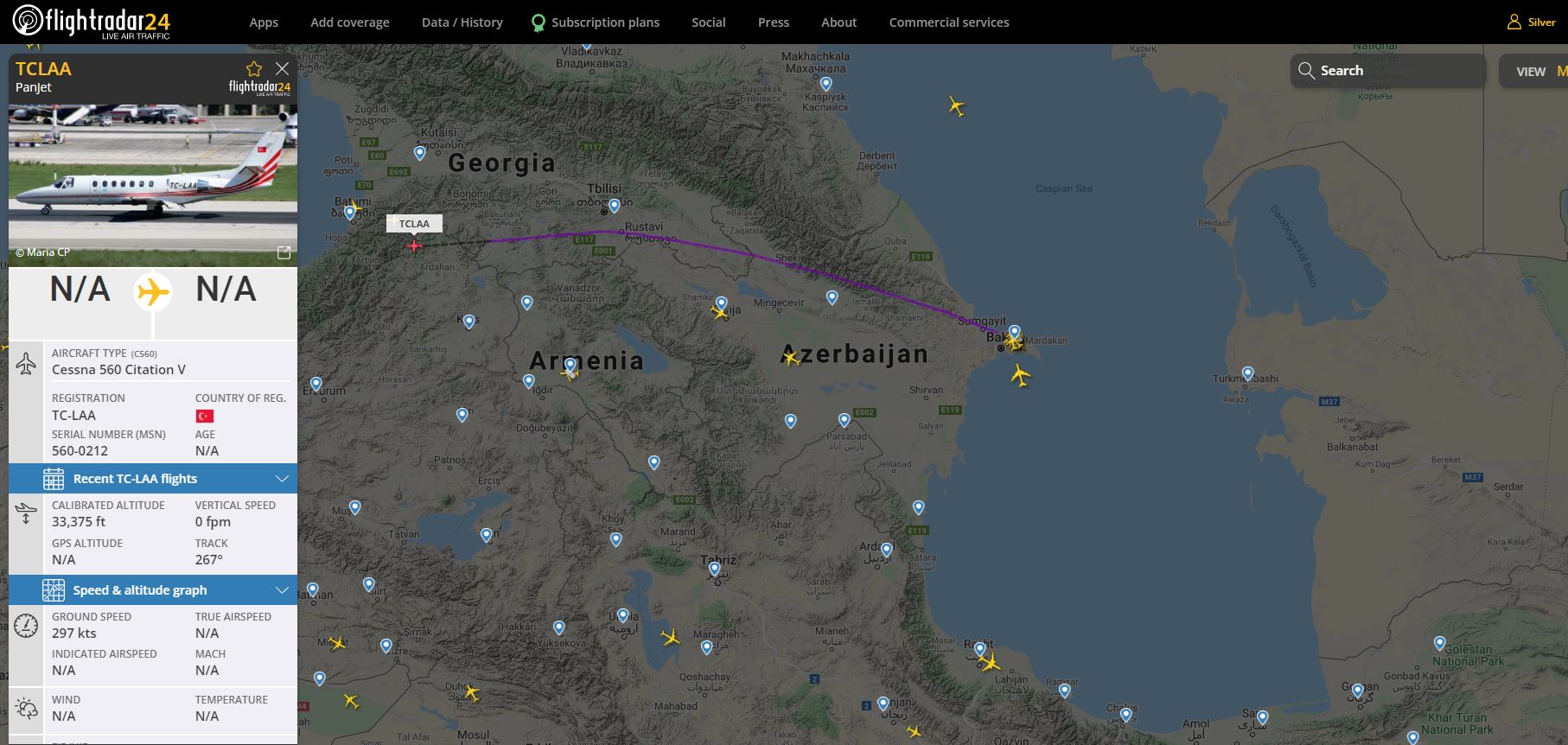
Turkmen President’s Great-Nephew Flown to Turkey by Air Ambulance
10.02.2022
Turkmen citizen Ayperi Annayeva has been unable to go abroad for a bone marrow transplant since spring 2020. Officials will not allow the 20-year-old to leave the country, insisting she must wait for the coronavirus pandemic to end and borders to be opened. But she cannot wait as she is dying.

Ayperi has been diagnosed with aplastic anemia, which means that blood cells are not being produced in her bone marrow. It is one of the most serious blood formation disorders. Without treatment patients with the most serious forms of aplastic anemia die within months. A bone marrow transplant is the only effective method of treatment and cure, as medicines provide only temporary respite.
Ayperi lives in Turkmenabat with her mother and brother. She was top of the class in school and in 11th grade came third in the Russian language state olympiad. At that time her future looked bright. She gained a university place without paying any bribes and was to study international relations at the International University of Humanitarian Sciences and Development in Ashgabat. She was looking forward to her studies and a busy student life.

But when she was 16, Ayperi fell seriously ill and instead of taking up her university place she had to look frantically for treatment. Local doctors didn’t know what to do and couldn’t even give her a diagnosis. The girl’s hemoglobin level fell to 30 grams a liter when the norm for an adult is between 120 and 180 (hemoglobin levels can be measured in children between three and six months old and the minimum level at that age is 95 grams per liter). Her relatives took Ayperi to India, where doctors ran all the tests and found aplastic anemia.
The family returned to Turkmenistan and began to raise money to pay for a bone marrow transplant in a foreign clinic. The operation costs from 70,000 dollars (with a close relative as donor) to approximately 200,000 (with an unrelated donor). Her relatives sold their apartment and asked charitable foundations for help. The German fund Ein Herz für Kinder (A Heart for Children) immediately allocated 20,000 euros.
In 2019-2020 the family managed to convert some of the money according to the state exchange rate. Currency exchange is practically forbidden in Turkmenistan. In cases such as Ayperi’s it’s possible but very difficult to get permission to make a conversion.
In March 2020 the family planned to leave for treatment in Belarus. Three of them would go: Ayperi herself, her mother (who would look after her) and her young brother (who would be her donor). They had bought the tickets and received an invitation from the hospital.
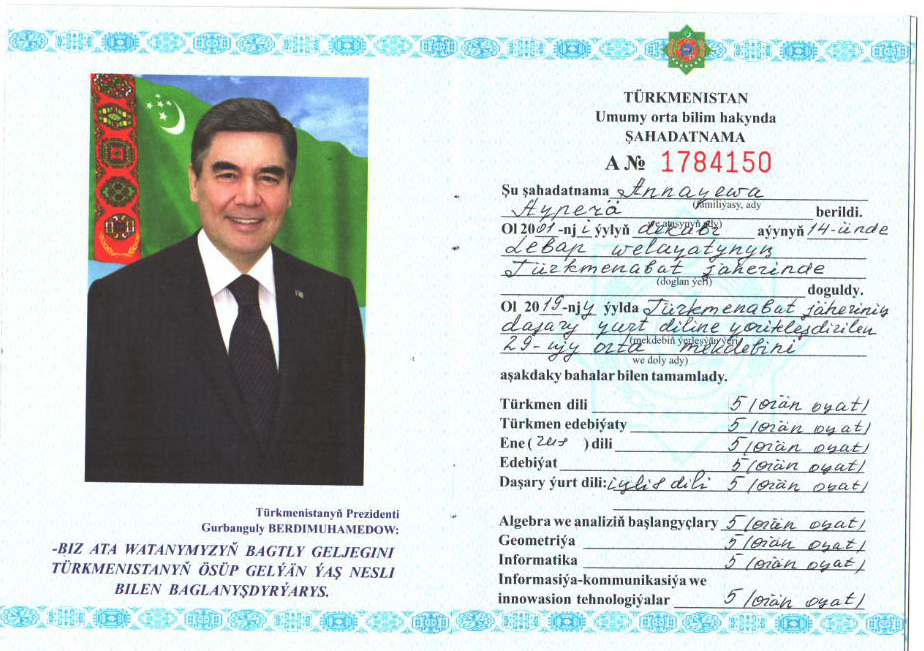
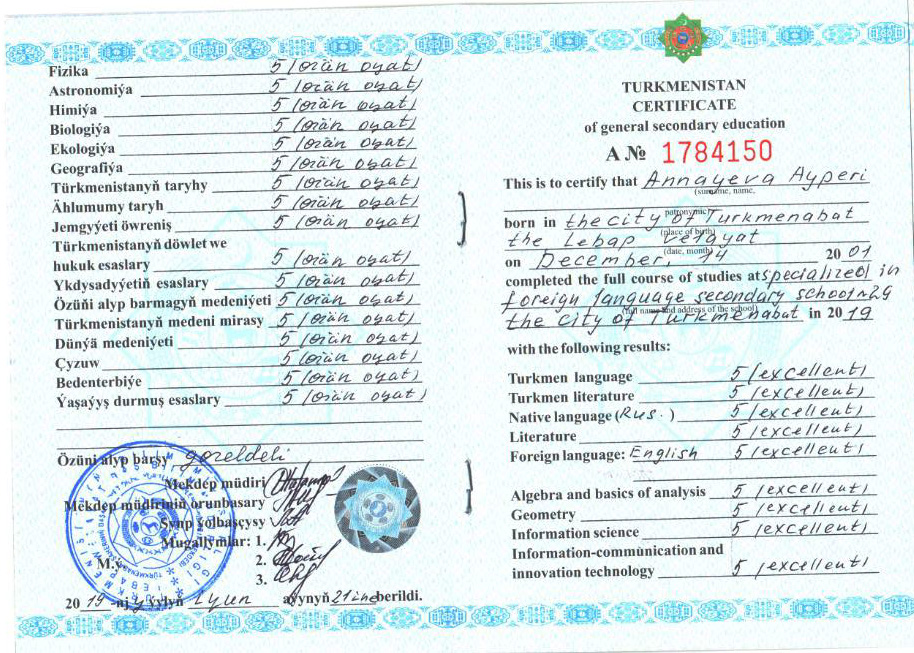

And most important – on December 16, 2019 the Health Ministry’s central expert commission to assess citizens’ applications for treatment abroad issued Ayperi permission No. 524 to receive treatment at the Republican Research and Practical Center for Children’s Oncology, Hematology, and Immunology in Belarus (turkmen.news has a copy of the document). The certificate was signed by seven members of the commission, including the then deputy minister Tachmurad Siliyev (dismissed in January 2020). The certificate of permission says that the patient’s relatives bear all responsibility for her health and the ministry is not responsible for any problems with money transfer or with Turkmenistan’s customs, border, and migration services.
Sadly, problems really did arise. The COVID-19 pandemic began and scheduled flights abroad from Turkmenistan were stopped. The borders were to all intents and purposes closed. Formally, the possibility of going abroad for treatment is envisaged and the Health Ministry should include such people in the lists of passengers for outgoing flights. But in practice the family could not get permission to leave the country.
They appealed not only to the Health Ministry, but to the Migration Service, the Foreign Ministry, and personally to Gurbanguly Berdimuhamedov. Some bodies ignored the request; others “lost” the documents or sent them to other departments; and others said Ayperi could go to Belarus when the borders are open. For example, the reply from the Migration Service dated July 16, 2021 and signed by the deputy head of the department, Sakhy Imamberdyev, says: “The request you sent on June 18, 2021 has been studied thoroughly and we inform you that you may go abroad in accordance with the terms and conditions set out in law, after international flights are restored in Turkmenistan.”

On July 30, 2021 the Health Ministry said in a reply to the family that the chief specialist at the health department in Lebap district had studied the documents. It was supposedly found that Ayperi “is receiving medication in accordance with Health Ministry instruction No. 333 on improving medical services to the population”. The reply was signed by Deputy Minister Chary Agamyradov, who replaced the aforementioned Siliyev.
All these arguments sound like mockery to Ayperi. The operation is urgent, a matter of life and death. No one has even an approximate idea of when the borders will open. It soon became clear that it would take years to solve the coronavirus problem.
Hormone treatments, which by the way Ayperi has to buy herself, only reduce the risk of hemorrhage, which is a very frequent occurrence with aplastic anemia. The girl is as fragile as glass, as any minor injury could have terrible consequences. She also feels weak and dizzy all the time. She cannot study or work. And the medications put major strain on her liver and stomach. As result, after three years of treatment Ayperi can no longer eat normally.
She had a blood transfusion, which can temporarily support the organism, once in India when she was 16. Doctors warn that frequent blood transfusions are harmful for aplastic anemia patients, as they lead to dependence and exacerbate the condition.
While the issue of travelling abroad for treatment was being decided, Ayperi turned 18. The Belarusian clinic said they do not operate on adults. The family approached an Israeli clinic who replied that they could treat the young woman but recommend that she approach their Turkish partner clinic since there are no direct flights between Turkmenistan and Israel. There are sometimes charter flights from Turkmenistan to Turkey. The Israeli doctors assured the family that the partner clinic meets all the requisite standards.
The young woman received an invitation to this clinic and to another Turkish hospital as well. She was allocated a quota and offered a discount.
But the Turkmen officials did not change their position. The Turkish doctors are shocked at their behavior. They constantly ring Ayperi’s family and ask if it’s true that the authorities will not allow a fatally sick girl to leave the country. The doctors have rung Turkmenistan’s Health Ministry, but to no avail.
Meanwhile, the German foundation has rescinded its guarantee letter for 20,000 euros. In 2020, the validity of the letter was extended until April 2021. But the foundation said they could not extend their guarantees a second time. They asked Ayperi to get in touch with them again when she could finally leave the country. The family no longer have enough money in their account for the operation. They are not even sure that Ayperi’s brother will be a suitable donor. If they have to search for an unrelated donor, the cost will rise sharply.
It’s a very different story when a member of the Berdimuhamedov presidential family has a health problem. (Following recent elections in Turkmenistan power was transferred from the father Gurbanguly Berdimuhamedov to his son Serdar.) In days, even hours they are either flown to a Turkish clinic or receive a visit from German doctors brought specially to Turkmenistan. It’s difficult to judge the Berdimuhamedovs for trying to use every opportunity to preserve the lives of their close relatives, and no one is saying that they shouldn’t be saved. On the contrary, it should be remembered that appropriate, life-saving treatment is the right of everyone, not only the leaders of the state and their families.
Neither Ayperi nor other seriously ill citizens of Turkmenistan are asking the state to pay for their treatment abroad or for help in reaching agreement with foreign doctors or for transport. They do it all themselves and simply ask the authorities to do one thing – not to get in their way.
Strange to say but Turkmen officials on various commissions dealing with citizens’ requests cannot always do this minimum. It is pointless to talk of any other human rights if there is no right to life and health.
How is it possible to risk the life of a bright young woman because of bureaucratic red tape? She’s done nothing wrong. Ayperi has already lost two years of her youth, which she cannot get back. We cannot allow her whole life to be taken from her!
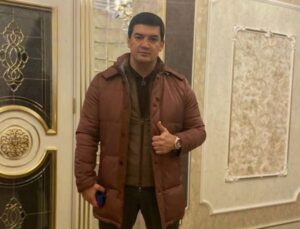
Upmarket Bar in Ashgabat Closed After Brawls Involving President’s Cousins
08.04.2024

Petrofac Back in Favour in Turkmenistan After Falling Foul of Berdimuhamedov
18.03.2024
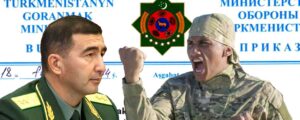
Turkmenistan’s Defense Minister Deprived Officers From Housing Entitlement Despite Widespread Resignations
28.02.2024
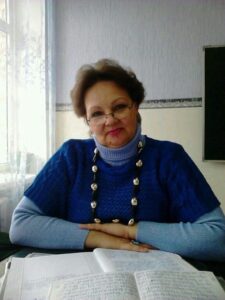
Murder and Suicide at Troubled Turkmen School
28.02.2024
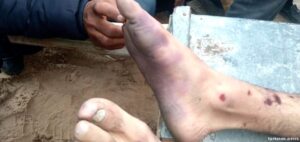
Turkmen Prosecutor’s Office Claims Baloch Detainee’s Fatal Wounds Were Self-Inflicted
01.02.2024
Tell us!
Add comment
your e-mail will not be published